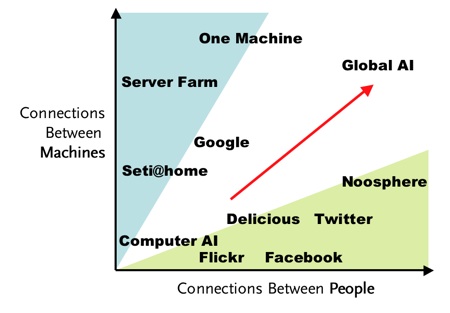
Yesterday, at ThinkerNet I posted "User Generated Content (UGC), Revisited", which led to interesting and constructive discussion. More or less, all of the discussion pointed to a broader issue implicitly mentioned by the original post, i.e., the limitation of Web 2.0.
To really understand it, however, we may need to review a few of the basics of economy. How is capital generated? When we say that our hard work produces capital, what does it mean? Is capital freely convertible to certain amount of labor and vice versa, or there is something more in the formula?
Capital generation demands labor. No new capital could be generated without labor. But labor only is not sufficient to produce capital. For example, throwing bottles to strangers is a labor, but hardly can it produce capital. To make the labor result be capital, the labor work must produce things that are exchangeable. The internal value of a product is measured by the amount of labor to produce the product; its true commercial value (i.e. the product as a piece of capital or asset) is, however, eventually determined by the degree of exchangeability of the product in the market. The commercial value of a nonexchangeable product is close to zero no matter how much the internal value of the product is.
By this mean, we have capital flow. Things that cannot exchange cannot flow; things that are hard to exchange are hard to flow; and so on. Exchange causes capital flow, and capital flow generates the wealth in our society. When a type of economy can consistently produce wealth to the society, it is a sustainable business model; otherwise it is not.
 The essential UGC-based Web 2.0 business model is not sustainable because it does not produce enough exchangeable product. This is the limitation of Web 2.0.
The essential UGC-based Web 2.0 business model is not sustainable because it does not produce enough exchangeable product. This is the limitation of Web 2.0.
In the post, I revisited a few fundamentals of UGC. From the study, I found that UGC primarily produces attention. Nevertheless does attention contain value, it is not a highly exchangeable product. The connection/attention generated by Web 2.0 help capital exchange rather than itself being capital. Therefore, the businesses built upon this model can hardly walk in a long journey into the future. We need to invent new models to build the real user-generated asset (UGA), or probably we may call it the exchangeable mind asset. By doing so, we will enter a new age of the Web---Web 3.0.
There is one more argument that is interesting. People used to say that nobody would like to pay to read a blog or a message. This is true. But there is actually one more sentence which should follow the previous one. That nobody is willing to pay is because Web 2.0 itself has not really produced anything that is worth of being purchased! Again, it tells the main limitation of Web 2.0.
There are many things we are willing to buy using money. For example, gold, a TV set, or even a pencil. Why do you want to buy them? They have internal value, AND they have exchangeable value, which makes them be asset more or less. Web 2.0, on the other hand, is poor on converting human's knowledge to be exchangeable capital/asset, despite it does help exchange capital in the other forms. This distinction tells the strength as well as the weakness of Web 2.0.
Anyway, from UGC to UGA is not trivial. It demands a great deal of ability of innovation to accomplish the request. But, at least, now we know where we should approach, don't we?







